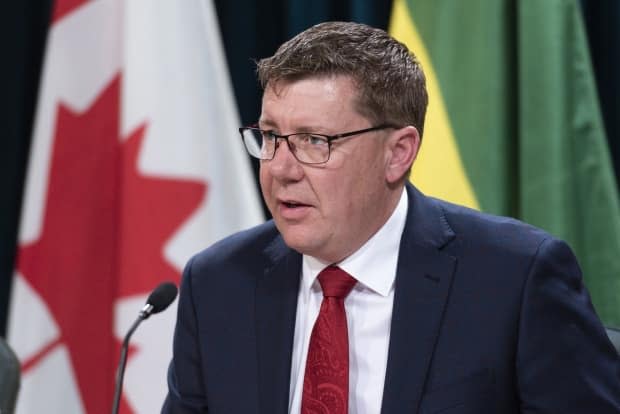'Initiatives' responding to Sask. COVID-19 nightlife outbreaks could come this week
Saskatchewan Premier Scott Moe said Tuesday that new measures in response to outbreaks at bars and nightclubs could be announced this week, but a Saskatoon epidemiologist says more precautions should have been taken before Monday's election.
"This is one area where we have had some challenges here in the province," Moe said at a news conference in Regina on Tuesday.
"I think you'll see [chief medical health officer] Dr. [Saqib] Shahab speak specifically to that and maybe specifically to some initiatives that will provide for a further opportunity to keep patrons safer in those specific situations."
He said any measures would be "surgical" and targeted rather than "broad-based" blanket changes.
Moe was speaking for the first time since his Saskatchewan Party was re-elected on Monday, returning him to his position as premier.
During the last week of the campaign, the single-day increase in new COVID-19 casesin Saskatchewan was more than 50 twice and 60 or higher three times.
By Sunday, 48 cases were linked to the Longbranch Bar outbreak, 22 cases were linked to Divas nightclub, 11 cases were linked to the Canadian Brew House in Stonebridge and eight cases were linked to Outlaws Country Rock Bar.
Moe said Tuesday that "virtually all" of the outbreaks in Saskatchewan have been linked to individuals, groups or organizations failing to follow provincial guidelines.
"We don't have to in my mind, at this point in time, have a broad-based restriction that would come in, for example on nightclubs, when the vast majority of the nightclubs are following the public health advice," he said.
"There may be something within those nightclubs where we can further prevent the spread, something that doesn't impact the business that they are conducting."
Pandemics don't wait for elections. - Dr. Nazeem Muhajarine, University of Saskatchewan epidemiologist
The owner of Divas nightclub in Saskatoon said earlier this month that health officials had fined his business $14,000 for not following COVID-19 procedures. He said at the time that officials originally approved the procedures the bar had in place and that he plans to fight the fine.
The Full Gospel Outreach Centre in Prince Albert was also fined for breaching COVID-19 guidelines at church gatherings.
Dr. Shahab said on Oct. 16 that new measures would be considered if the number of new cases in the province reached around 60 daily.
"Certainly we would have to consider at that time, 'OK what further interventions can we put in place?'" Shahab said during a news conference.
CBC contacted the Greater Saskatoon Chamber of Commerce for a response, but did not receive a reply before the time of publication.

University of Saskatchewan epidemiologist Dr. Nazeem Muhajarine said the province should have taken action to address climbing case numbers before the election.
"Pandemics don't wait for elections," said Muhajarine.
"I don't understand what we are waiting for right now. How many new cases do we need to turn day after day before we can actually take some additional public health measures in order to start flattening that curve?"
Muhajarine said he is concerned that case numbers will continue to grow if urgent action is not taken.
He said comments from provincial health officials and the premier saying outbreaks are linked to a small minority of rule-breakers are "excuses."
'Every day counts'
Muhajarine said targeted measures to address the source of outbreaks, rather than widespread closures or shutdowns, are needed.
"Every day counts," he said.
"If we have 60, 70 new cases each day, that's 60 or 70 new cases that could get many more cases tomorrow, day after and so on."
There are currently 652 known active cases in the province — the highest number since the pandemic reached Saskatchewan in March.
The areas with the highest case numbers on Tuesday were the north central (128), Saskatoon (190) and Regina (105) zones.
Moe said the province has a better understanding of the virus and of effective public health responses now than earlier in the pandemic, when travel was restricted to and from northern Saskatchewan due to an outbreak in the La Loche area.
He said infections are now increasing among young people in particular.
Safe Schools Saskatchewan, an advocacy group for COVID-19 measures such as mask-wearing to protect children in schools, said community spread is making its way into schools.
"Now that the election is over, Safe Schools Saskatchewan expects to see strong government action to reduce community transmission in all areas of the province. Mandating masks in all public spaces would be the most efficient way to accomplish this goal," said spokesperson and retired teacher Margi Corbett in a written statement.
"The economy relies on schools to be open and running as a safe place for children to learn and be cared for during the day."
Consequences for community's most vulnerable
Suellen Beatty, CEO of Sherbrooke Community Centre in Saskatoon, said it is heartbreaking to see residents become more isolated as a consequence of community transmission.
"It's a very difficult situation and I would call it a balancing act," said Beatty.
"We have a lot of COVID in the community. And of course, what we're trying to do in long-term care, in our special care homes, is reduce the risk of someone with COVID coming into our community."
She said screening reduces the risk of COVID-19 entering a long-term care facility, but does not guarantee protection.
Beatty said she hopes people thinking about breaking public health rules will consider the risk to the community's most vulnerable people.
She said she thinks the provincial response to the pandemic has been reasonable and supports the measures taken to date.

